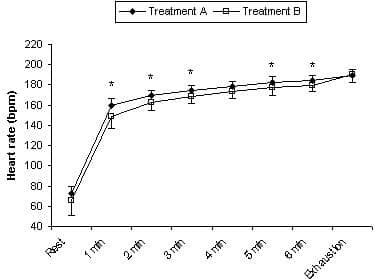Several descriptive studies suggest that a reduction in locomotor muscle force (fatigue), in addition to muscle-energetic and cardio-pulmonary factors, is an important determinant of exercise tolerance in humans (1,2). However, this hypothesis has never been tested experimentally. Six male subjects (age 21 ± 2 years, height 176 ± 6 cm, body mass 81.9 ± 16.1 kg, [vdot]O2max 48.6 ± 9.2 ml/min/kg) were tested twice in a randomised counterbalanced order (AB/BA design). Treatment A consisted of 100 intermittent jumps (one every 20 s) from a 40 cm high bench. This protocol is known to induce a long-lasting reduction in knee extensor strength (KES) (3). Treatment B was 33 min of rest. Before and 2 min after treatment, KES was measured with an isometric dynamometer chair. Twenty minutes after treatment, subjects exercised on a Lode cycle ergometer at 80% of their peak power output (281 ± 52 W) until exhaustion. Cardio-pulmonary measures at rest, during the first 6 min of exercise (isotime), and at exhaustion are presented. Blood lactate (La) was measured before and 1 min after exercise. A wash-out period of 10-14 days was prescribed to control for muscle damage. Muscle soreness and blood creatine kinase (CK) were measured before treatment. Values are mean ± SD. Paired t tests were used to compare treatments. The wash-out period was effective as no evidence of muscle damage was found before treatment (Table 1). As expected, Treatment A significantly reduced KES compared to Treatment B with minimal metabolic disturbances (Table 1). This muscle fatigue significantly reduced time to exhaustion by 13% (Treatment A, 633 ± 238 s: Treatment B, 724 ± 274 s, P = 0.034). The only cardio-pulmonary response to exercise significantly affected by locomotor muscle fatigue was heart rate (Fig. 1). Post-exercise La was not significantly different between treatments (Treatment A, 9.3 ± 1.1 mmol/l; Treatment B, 10.5 ± 1.6 mmol/l, P = 0.137). This experimental study demonstrates for the first time that locomotor muscle fatigue is an important determinant of exercise tolerance in humans. Compared to previous studies using pharmacologically induced muscle weakness (4,5), the effects of exercise-induced muscle weakness on the cardio-pulmonary and metabolic responses to exercise seem less significant. However, locomotor muscle fatigue might contribute to the cardiac drift observed during prolonged exercise.
University College London 2006 (2006) Proc Physiol Soc 3, PC132
Poster Communications: Effect of locomotor muscle fatigue on whole-body exercise tolerance
Samuele Marcora1, Andrea Bosio1
1. School of Sport, Health and Exercise Sciences, University of Wales-Bangor, Bangor, Gwynedd, United Kingdom.
View other abstracts by:
Figure 1. Heart rate response to exercise. * P < 0.05
Table 1. Pre-exercise conditions
Where applicable, experiments conform with Society ethical requirements.


